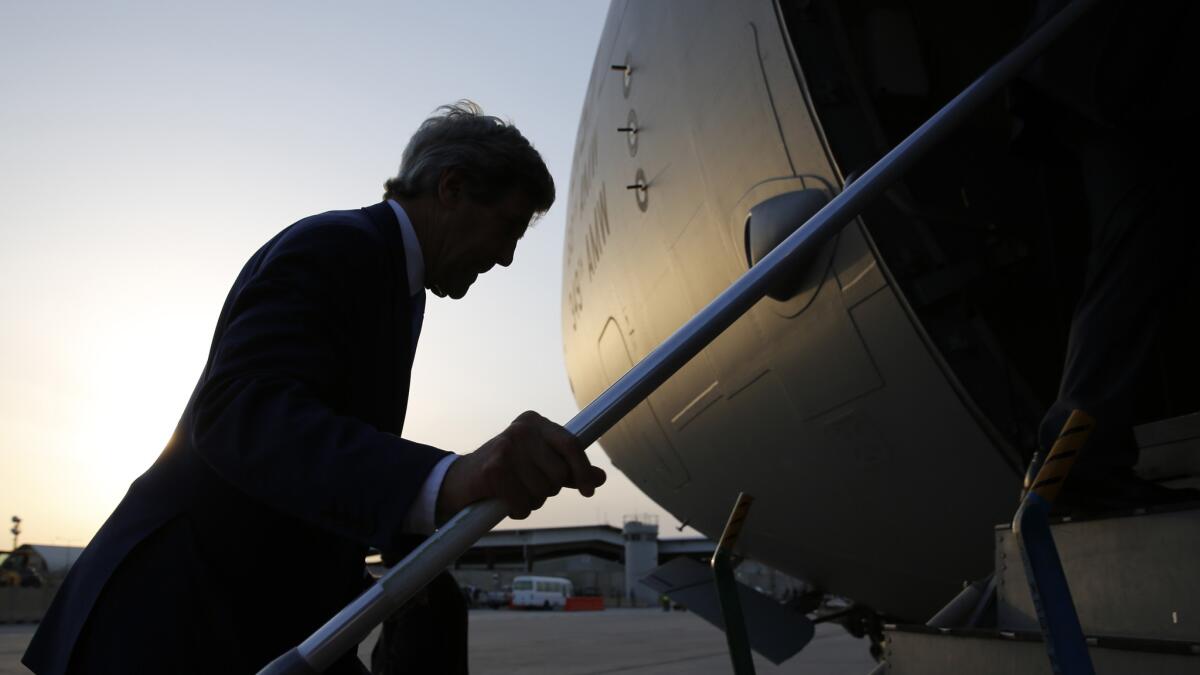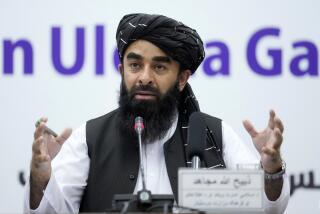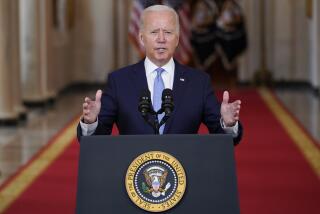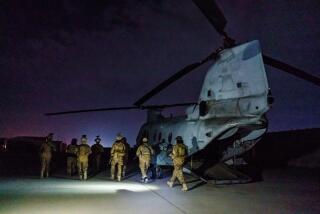After Iraq, Kerry confronts similar problems in Afghanistan with another unannounced trip

U.S. Secretary of State John Kerry boards his plane at Baghdad’s International airport before leaving Iraq on April 8.
U.S. Secretary of State John Kerry hoped a brief stop Saturday in Afghanistan would help promote cooperation from a would-be “unity” government that has proved largely incapable of running the country less than two years after he worked to install the leadership team.
For America’s top diplomat, it was the second visit in as many days to a country that the United States long has wished to stabilize. On Friday in Baghdad, Kerry backed efforts by Iraq’s prime minister to settle a political crisis and stressed the importance of having a “unified and functioning government” to confront the Islamic State group.
In Kabul, Kerry scheduled a joint meeting with Afghan President Ashraf Ghani and his rival, Chief Executive Abdullah Abdullah, and later planned to see each leader separately. Kerry was expected to participate in talks on security, governance and economic development.
Afghanistan remains largely lawless, is rife with corruption and struggling to check the Taliban’s stubborn insurgency.
“We need to make certain that the government of national unity is doing everything possible to be unified and to deliver to the people of Afghanistan,” Kerry told Foreign Minister Salahuddin Rabbani and other officials. Kerry said he would tell Ghani and Abdullah to drop their “factional divisions.”
The challenges in Afghanistan are not unlike those Kerry encountered Friday in Iraq.
The U.S. invaded both countries under President George W. Bush and hoped to foster stable democracies. It hasn’t happened, even though the U.S. has spent some $2 trillion so far and several thousand Americans have died in military operations.
Governments in both countries lack control over significant areas. Afghanistan’s war against the Taliban is entering its 15th year. Iraq is still trying to muster the strength for an assault on Mosul, its second largest city, and other places held by the Islamic State group.
Sectarian and personal rivalries threaten both governments. Security vacuums in each threaten the United States.
Despite President Barack Obama’s pledges to end both wars, American troops cannot just leave. There are 9,800 U.S. forces in Afghanistan, set to drop in principle to 5,500 next year. In Iraq, there are 3,780 now.
Obama has less than 10 months to leave both places in better shape, but the strategies differ: In Iraq, the U.S. seeks the destruction of Islamic State; in Afghanistan, it hopes to draw the Taliban into peace talks.
First, however, the Kabul government might need to reconcile its own divisions.
Following a bitterly fought and inconclusive presidential election in 2014, Ghani and Abdullah are sharing power under a deal Kerry brokered. But the partnership has never really been defined and the government is in disarray. There are predictions it could collapse due to corruption and incompetence.
After almost two years, Ghani and Abdullah have failed to set aside their rivalries. The bitterness stems from a belief in Abdullah’s camp that the election was stolen and gifted to Ghani — an anthropologist who lived in the U.S. for three decades — as someone with whom Washington could more easily do business.
The leaders also are seen as pandering to different constituencies: in Ghani’s case, the majority ethnic Pashtuns, and in Abdullah’s, the Tajiks.
The pair recently cleared their diaries for a full-day meeting to iron out differences. They gave up after only two hours, Afghan and foreign officials said.
The country’s defense minister and intelligence chief are acting in their posts because the parliament has not confirmed them; several other ministers have resigned. A cabinet reshuffle is expected soon.
Afghanistan’s economy is contracting. Unemployment stands at 25%. Afghanistan needs to secure more international aid. The Taliban are nowhere near a defeated fighting force, while an Islamic State affiliate may be making inroads. The much-hyped peace process has been all but dead for almost a year.
ALSO
Israel’s military caught in rift over soldier’s shooting of knife assailant
Another mysterious death in Kandahar, and allegations of official torture
Syria says Islamic State extremists abducted hundreds of workers near Damascus
More to Read
Start your day right
Sign up for Essential California for news, features and recommendations from the L.A. Times and beyond in your inbox six days a week.
You may occasionally receive promotional content from the Los Angeles Times.






